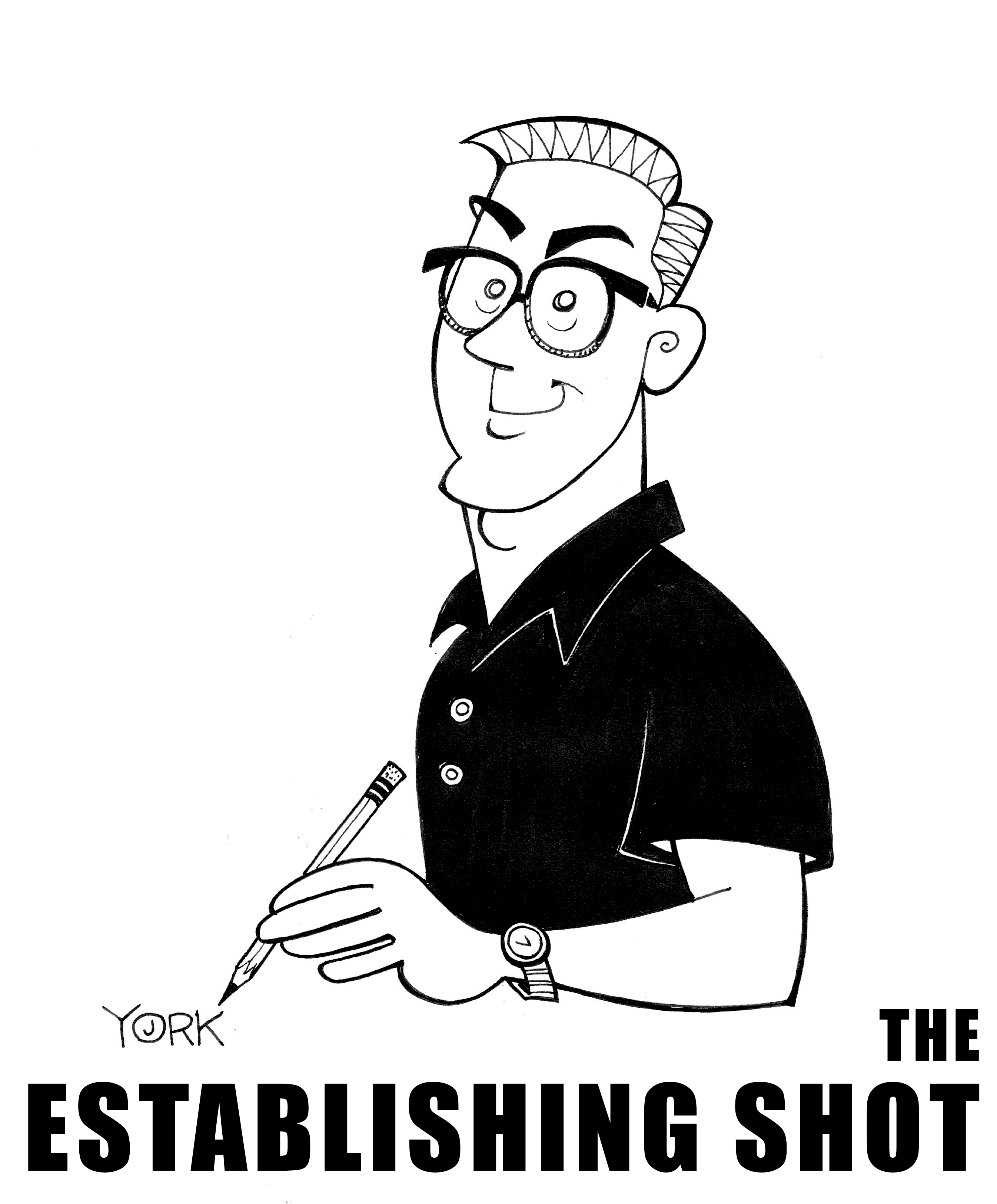
Original caricature by Jeff York of Jonathan Pryce and Anthony Hopkins in THE TWO POPES (copyright 2019)
Lush locations in cathedrals, Italian gardens, the streets of Rome, not to mention extended flashbacks showing the early religious life of Father Jorge Bergoglio, they are all on display in the beautifully photographed new film THE TWO POPES. No matter, such a two-hander comes down to its central characters and how the duo in the title sit across from each other and talk. Even with all the gorgeous window dressing, these two characters, and the two actors playing them are the sight to see here. And in playing Pope Benedict and Cardinal Bergoglio, Sir Anthony Hopkins and Jonathan Pryce give two of the year’s most compelling performances, making every moment of their squaring off with each other into a fascinating battle of wills. The stakes are the future of the Catholic Church in 2013, and the fight for its future makes for both a crackling drama and an incredibly inspiring one too.
Director Fernando Meirelles (CITY OF GOD, THE CONSTANT GARDENER) wisely cast Hopkins and Pryce as they are both actors who can be fierce and intense barely moving a muscle. Indeed, the two priests they’re playing are not exactly men given to bombast and tantrum. But these two actors mix it up nonetheless with the subtlety of how they hold their gaze, tilt their bodies, and hesitate before speaking their lines. In fact, the best part of both performances lies in how they listen to each other. Those silences speak volumes.
For the audience, watching such sparring is like watching water simmer to a boil. Still, neither actor showboats or tries to trump the other. If anything, both underplay, especially Hopkins, who keeps his potential to explode hidden well underneath his fancy dress whites. His character Benedict is a conservative, on the losing side of modernity, whereas Bergoglio is progressive, and how the church deals with the ever-burgeoning molestation scandal amongst the priesthood is the primary focus of their tete-a-tete.
When voting on the new pope in 2005, Cardinal Ratzinger bested Bergoglio, a close victory for the hardliners. Ultimately, it was the wrong move for the times, with the more traditional agenda ending up coming off as incredibly tin-eared to the changing times and causing thousands of parish members to flee. Now, Benedict is facing how to lead a flock that he’s lost, and to make matters worse, his health is failing. He’s even gone blind in one eye. He literally and figuratively cannot see how he can change his years of orthodoxy to address the new needs of the future church.
That’s where Bergoglio comes in. Benedict has summoned him to the Vatican to discuss heading up a reform agenda. Unbeknownst to the Pope, however, is that the Argentinian cardinal wants to resign as he’s grown frustrated with the exact failures of Rome to act with a more modern touch. This leads to all kinds of ping-ponging banter in the first hour, underscored by neither man wanting to look too vulnerable, or come off as too rude.
It’s exceedingly clever of Anthony McCarten’s script, adapted from his play The Pope, to have these two virtuous men refrain from being wholly honest. That approach turns the first half of the film into a comedy of manners. Amongst the green gardens and ornate rooms, these two dodge and weave each other almost like pugilists, albeit one who must walk with a cane (Benedict) and the other with diminished lung capacity.
Still, as their meeting progresses, so does their friendship and honesty. Hopkins is especially good at conveying the shock when he must recognize certain truths his underling tosses his way. Hopkins’ eyes tell so much of Benedict’s story, widening in surprise at truths he’d rather not see and then looking away from them in shame. As for Pryce, he uses his eyebrows deftly, raising them ever-so-slightly to convey amusement or anger. Meirelles keeps his camera oh-so-close to the two men to catch all the nuance chasing across their expressive faces; faces as exciting to see in action as most chase scenes in an actioner.
In the second hour, after arguing about whether the church should be more forgiving of topics it has been adamantly opposed to in the past – divorce, priest’s marrying, homosexuality – Benedict’s motives are put on the table. He realizes that the church must be more progressive and that his health issues will not help it get there. He suggests a transition of power to his colleague. Bergoglio is flattered, but worries about his own faith, one tortured by a past in Argentina where he failed to stop the fascists from wrecking the country. With extended flashbacks showing the young priest (played well by Juan Minujin, a genuine ringer for Pryce), we see the backstory of a man who’s always struggled with his faith and where it fits in the modern world.
The flashbacks are a calculated gamble, vivid and memorable, though stealing from some of the interaction between the two actors. Nonetheless, they move along deftly, and get out of the way for the third act, returning to the two grand men. For those not vested in religion or the papacy, the film still should still enthrall as it is a moving portrait of power, aging, and change.
The idea that one can change at any age harkens back to Dickens’ A Christmas Carol in its way. The film endorses the powers of individuals to change their lives and those around them. And the movie is a ringing endorsement of character driving story, within both this fascinating story and the two incredible talents bringing these exceptional men to life. What a lovely gift for the holidays.







